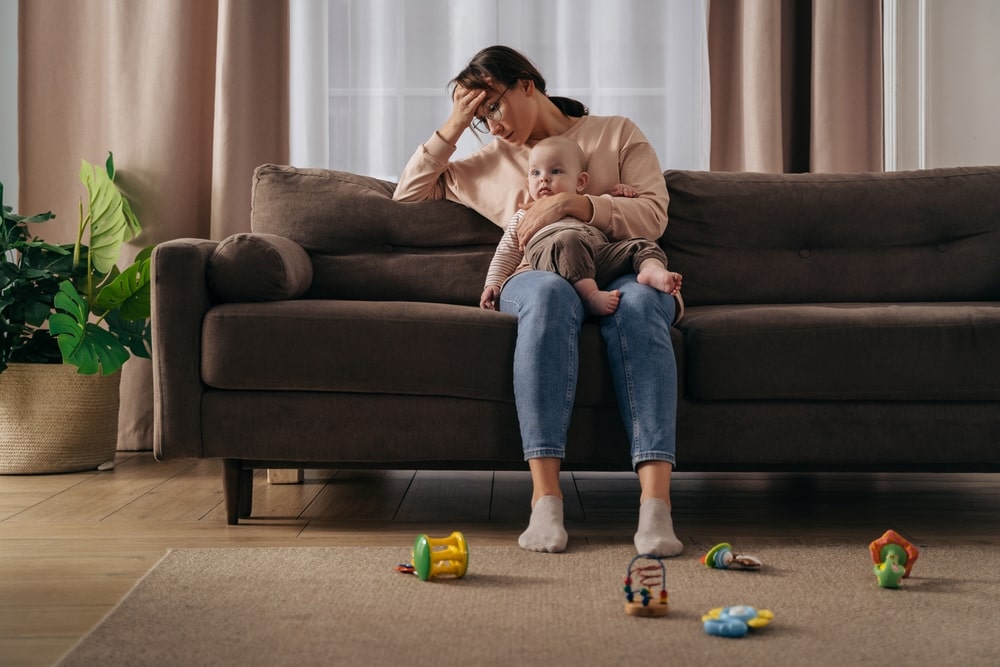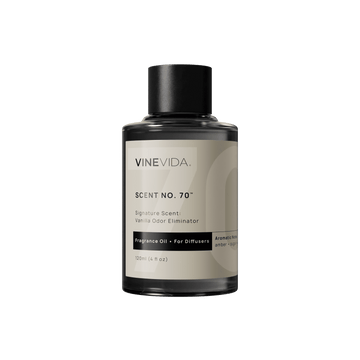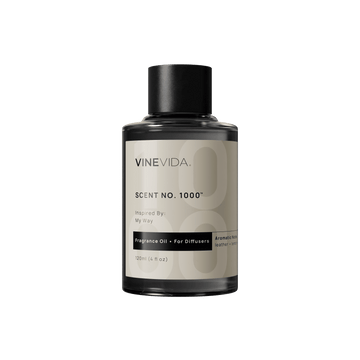Becoming a new mom must be one of the most joyful yet stressful things to happen to a woman. We’re told we are supposed to have this huge surge of maternal connection to our child, but for many women, that just doesn’t happen.
The media forces us to believe that this connection is everything; women feel guilty and depressed when it's absent. Add to that the lack of sleep, difficulties with breastfeeding, and the change in relationship with our partners. For some women, maternity will mean a huge drop in income. In this article, we'll look at essential oils for postpartum depression.
Changes in hormones can often cause baby blues, a normal and understandable reaction to birth. Essential oils can help with the transition, physical healing, and hopefully sleep.
The most helpful essential oils for postpartum depression are Rose, Melissa, Ylang Ylang, Lavender, Geranium, Frankincense, and Myrrh. They help to balance the hormones, lift the mood, and aid uterine healing and perineum soreness.
I like to stress that while essential oils for postpartum depression can be extremely helpful, they should not be seen as a substitute for speaking to a medical professional. The mood can drop fast and hard after you have given birth.
It’s thought that as many as one in ten women will suffer from postpartum depression, usually (but not always) beginning in the first eight weeks after birth. Please always make sure you speak to your physician or midwife about any mental changes. They will be able to support you and help you take care of your new child.
How to Use Essential Oils for Postpartum Depression
An important part of using essential oils for postpartum depression is understanding that the baby wants to smell you.
It can be tempting to burn lavender in a diffuser to help them sleep. The most disturbing thing you can do to a new baby is to confuse their sense of smell. Babies navigate the world through smell, and it frames their first recognition of people. So if you can convince the baby that mum smells of roses, it’ll be easier to integrate that into your surroundings.
Breast Pad
I recommend putting one drop of essential oil onto your breast pad, then putting that oil side outwards inside your bra. That will transfer the oil's fragrance onto your skin and out into the world. You will also be inhaling the molecules throughout the day.
When a baby breastfeeds, they will be able to smell the oil combined with the smell of you and your milk. This will become their new picture of what you smell like.
We can put the breast pad into the baby's crib at night and soothe them to feel you are near.
Aromatic Baths, Creams, and Lotions are also a great help.
Incidentally, slightly off-topic but connected, there is a post about essential oils for breastfeeding if that is of concern.
What Essential Oils are Good for Postpartum Depression?
1. Rose
Rose essential oil is the most womanly of all the elixirs. It has an anti-conflict nature to it and encourages love. It has a softness, balances h,ormones, and is of an antidepressant nature. Rodent trials reveal it as hypnotic, helping us to fall asleep and stay asleep longer.
We have discussed how babies have a different cortisol response than the rest of us. Naturally, most adults have a natural surge of cortisol around 30 minutes after rising in the morning (people with Asperger’s do not have the same reaction). Levels then naturally fall throughout the day but spike during times of stress.
As stated, babies do not have the same response. Until they reach the age of two, their response mimics mom's. So if the mother’s cortisol response is to spike, babies' cortisol levels will go up too. Not only do they feel stressed, which will cause them to cry more, but that then circles around to make mom even more stressed.
So, the way to manage this situation is to use rose oil, which affects the body’s cortisol response, to calm the mom’s stress, and hopefully, the baby’s stress will follow.
I recommend bathing in rose essential oil or making yourself a body lotion to wear throughout the day.
2. Melissa
Melissa essential oil is uplifting and joyful. It has gentleness to it and is extremely helpful for aiding sleep.
Although there is little research on the essential oil, research reveals lemon balm extracts to be wonderful for soothing afterpains and alleviating baby blues. (If you did not know, Lemon Balm is the common name for Melissa officinalis.)
Lemon Balm extracts might refer to hydro alcoholic extract, a solid capsule you can get from the health food shop, or simply lemon balm tea. Research shows that lemon balm tea every eight hours, can be equally effective for after pains as the more commonly prescribed mefenamic acid.
I recommend blending Melissa essential oil into a lotion with Jasmine and Rose, both uterine stimulants that will help the womb contract and support mum emotionally.
For baby blues, perhaps place one drop of Melissa essential oil onto a tissue for mum to inhale or into an aroma pendant.
3. Ylang Ylang
Ylang ylang is nature’s natural balancing oil. It helps to stabilize hormonal fluctuations and is euphoric and relaxing.
It has natural pain-killing actions as well as an antianxiety nature.
I always like to say that ylang ylang is harmonizing. If you feel your mother-in-law has too much to say about your ability to rear children, this might be a great way to navigate that. Stick some ylang ylang in a diffuser and walk away.
4. Lavender
I had my first child almost 30 years ago, and we were told to sit in a saltwater bath to clean the wound if we had any stitches. I had my last child just over 10 years ago, and nobody recommends it now. However, I feel that a bath with some lavender oil and salt in the water cleans and soothes the wound.
It is no longer considered best practice because both lavender and salt dry the skin, and the salt can make it a bit itchy and flaky. Lavender soothes that, but of course, as we know, it too is drying. If you use geranium or rose essential oil, this will counteract the drying action of the salt. As discussed, using them in a lotion will have lots of benefits.
Lavender is wonderful for sleep and is soothing generally.
Do not be constantly tempted to put the lavender essential oil on the baby to help her sleep. It is likely to have the opposite action. As discussed earlier…breast pad aromatherapy rules.
I go into this in much more detail in our post: Is lavender essential oil safe for babies?
5. Geranium
Geranium is soothing and supportive in times of stress. It supports the adrenal cortex, the part of the gland that responds to times of stress.
If you can’t afford rose essential oil, this will not have the same profound effect on the uterus but will be just as good for managing the cortisol response. To substitute the uterine action, consider using myrrh essential oil.
6. Myrrh
Myrrh is contraindicated until 37 weeks of pregnancy because of its strong action in the womb. Using myrrh essential oil during labor or postnatally will not only help the womb to contract and return to its normal size. It is a naturally soothing and uplifting essential oil.
There is something very womanly yet strong about myrrh essential oil. It has depth and grit and instills courage and determination when times are hard.
Myrrh’s most important action is as a skin healer, so if there has been profound trauma to the perineum, then myrrh essential oil in the bath can be extremely helpful. Myrrh, lavender, and geranium compresses are also helpful for hemorrhoids.
7. Frankincense
Frankincense slows the breath, helping us feel calmer. When we feel incredibly stressed it's comforting and reassuring? Rodent trials show frankincense essential oil can help reclaim the sleep deficit. This is a powerful medicine for new parents being kept awake all night.
Conclusion
Essential oils for postpartum depression are supportive and healing, but they are no substitute for talking to a medical professional. The oils can be used safely alongside prescribed medicines, and I would also recommend checking out our page of essential oils for an uplifting mood. Please feel free to add comments if you have any other recommendations fand or using essential oils for pain, postpartum depression.
Recommended Reading:



















